What’s NOT in Your Control and What Is
While my title seems like a simple one, you’d be shocked how
many people don’t realize this. Especially the “fertile public at large”, as I
like to call them. I’ve lost track recently how many people, patients, friends,
etc. have said in some shape or form, “I thought when you did IVF, it would
work.” Dude – I hear you. No really, I get it.
I Was Fooled Too
When I was trying to conceive, my only real point of
reference was a co-worker I knew that did IVF. She was (as far as I knew at
that point) the only real live person I knew that did IVF. She, remarkably, not
only got pregnant on her first IVF but she got pregnant with twins: one boy and
the other a girl. Boom. Done.
So, after several timed cycles and several IUI’s, my doctor
suggested IVF, I thought, “Ok, I guess it’s time to pull out the big guns.” There
was little doubt in my mind it would work. But it didn’t. Not at all. Actually,
out of all of my several IVF cycles, my first was the one I had the most
embryos on and I very much got my period. I was floored that I just paid
$15,000 to get my period.
The Statistics Suck
Did you know (and you may want to sit down) that according to
a 2015 study published in the Journal of the American Medical Association
(JAMA):
- Women abandon IVF “too soon”. They define this
as after THREE or FOUR unsuccessful attempts. Yup, three or four. - If women continue with IVF, they have a 69%
chance of having a baby after nine IVF cycles. - The majority of women – 65.3% of patients in the
study – achieved success after six cycles of IVF, particularly if they were
under the age of 40. - On average, the process of success for IVF (i.e.
six to nine cycles) will take a total of two years, which is similar to rates
that couples conceiving naturally take in one year.
Six to nine cycles. SIX TO NINE CYCLES. How many people do
you know have the coverage for nine cycles? And all of this without any real
guarantees? An anonymous online survey was conducted by ARC Fertility, EMD
Serono and Resolve: The National Infertility Association in the U.S. to assess
how infertility benefits offered. (July/August 2016) and of those with
insurance:
- 47% reported less than half the cost of one full
IVF cycle was covered. - 61% of respondents without IVF insurance paid
out of pocket costs between $15,000 and $30,000 for ONE cycle of IVF.
What is Your Point?
You may be asking yourself, “Jay? Why the hell are you
writing this? You’re bumming me out.” I’m writing this for three reasons.
- I’ve connected with someone who wasn’t successful (I’m not using the “f-word”, the F being Failed) on her first IVF and she has been genuinely devastated about it for months now as if it’s her fault. Please consider this a Public Service Announcement that really: this is medicine, statistics and actual bullshit but no one’s fault.
- Recently, David Sable wrote a piece for Forbes that I feel said it best, ” The truth is, when IVF fails a patient, IVF has failed. Not the patient.”
- I want to again point out that the fact that patients are being charged for a medical issue in the country for a medical procedure they need to expand their family when we know they need a certain amount of treatment makes no sense.
Now That I Want to Cry, What CAN I Do?
- If your insurance is through your job, speak to
your Human Resources representative and ask them about getting IVF covered by
insurance. - Reach out directly to your insurance company and
ask for certain that IVF isn’t covered. Request for either an Exemption of
Benefits and ask how you can file an appeal to get IVF covered by insurance. - You can also request any documentation from your
doctor supporting why IVF is medically necessary for you to have a family
(including any diagnostic codes, tests, etc. explaining why your reproductive
endocrinologist is recommending in vitro fertilization). - Speak to your accountant about whether any money
you’ve spent previously can be filed under “medical” when you file your taxes. - You can look into whether or not your Flexible
Spending Account (FSA) or your Healthcare Savings Account (HSA) can be used
towards IVF. - Ask your doctor and/or clinic if there are any
IVF clinical trials that you qualify for that may cover either the cycle or any
of the medication. My second IVF was through a clinical trial and it was FREE.

While a lot has changed for me personally (and as you can see, the location of my blog), my passion for advocacy remains. Corny but true. The more I learn, and I continue to learn about infertility, insurance, reproductive health all the time, the more it both fascinates and, well, kind of depresses me as so much of this doesn’t make sense.
For now, I just want more people to know that IVF, while a
powerful tool that’s helped millions, VERY UNFORTUNATELY doesn’t mean instant
success. That’s not your fault. None of this is your fault and a lot of this is
out of your control which sucks hard. You can only advocate for your health,
your care, your treatment and your rights… and maintain your sense of humor. I
firmly recommend doing whatever you can to make yourself smile. Watching
Schitts Creek, home facials, water guns, manicure’s and writing angry, yet
colorfully worded poems. You heard me.


